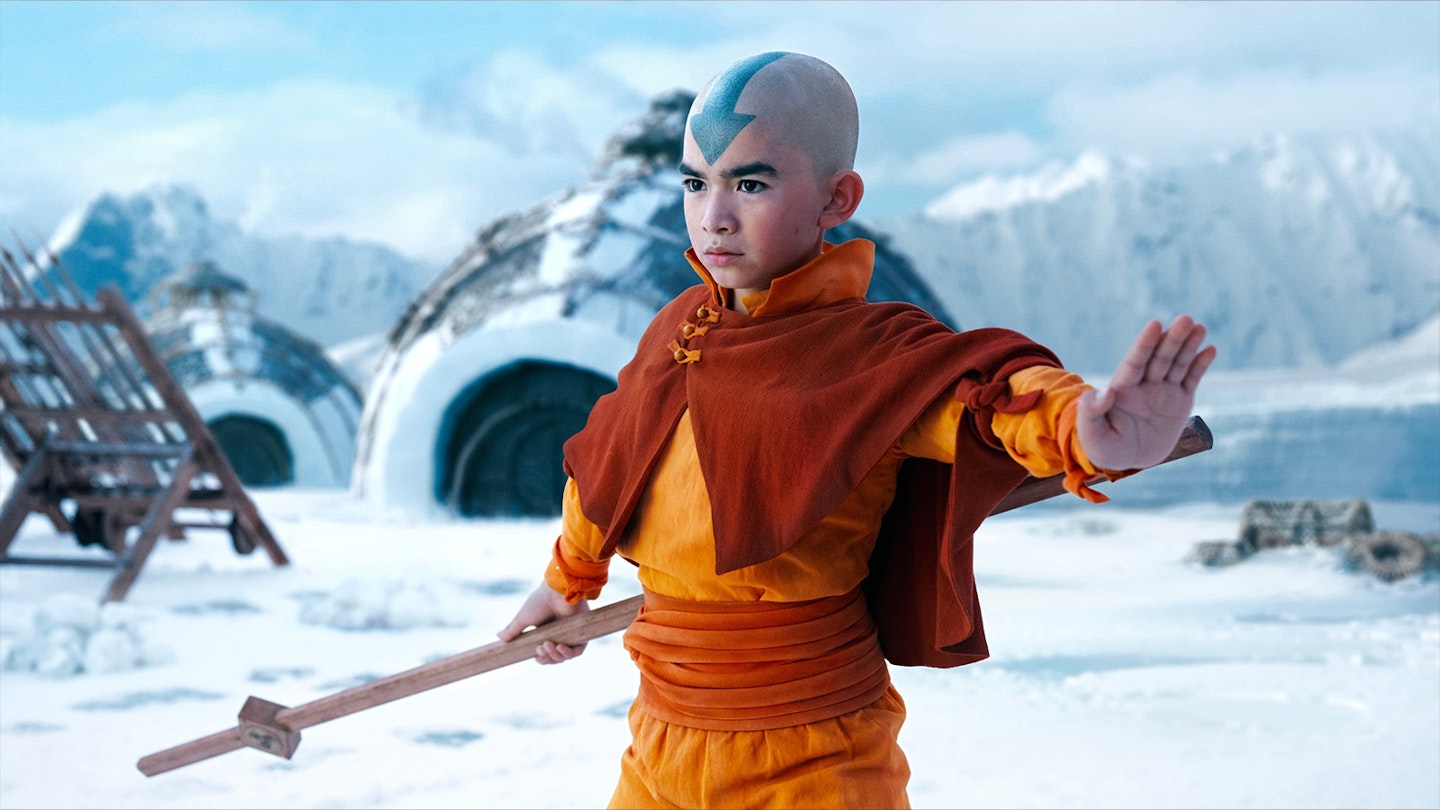In an era of high expectations and adaptation fatigue, few shows carried the weight of fan hopes like Netflix’s Avatar: The Last Airbender (2024). Tasked with reimagining one of the most beloved animated series of all time, the live-action remake walked a razor’s edge between honoring its source and evolving it for a new audience. The result? A visually rich, emotionally charged adventure that doesn’t always nail every element — but burns bright with ambition, heart, and elemental power.
Set in a fantastical world where people can manipulate the elements of water, earth, fire, and air, Avatar: The Last Airbender centers around Aang (played by Gordon Cormier), the last surviving Airbender and the reluctant Avatar — the one destined to bring harmony to a world torn apart by the Fire Nation’s expansionist war.
Awakening from a century-long slumber in an iceberg, Aang teams up with Katara (Kiawentiio), a waterbender from the Southern Water Tribe, and her non-bending brother Sokka (Ian Ousley). As they journey across the continents, Aang must confront his own fears, rediscover lost traditions, and ultimately master all four elements to defeat the tyrannical Fire Lord Ozai.
But perhaps the most compelling journey belongs to Prince Zuko (Dallas Liu) — a banished Fire Nation prince torn between duty, honor, and his desperate desire to restore his place in his father’s eyes.
One of the greatest challenges the show faced was living up to the legacy of the 2005 animated series, a story many fans consider near-perfect. To its credit, the 2024 live-action version remains deeply respectful to the spirit of the original — recreating key moments like Aang’s duel with Admiral Zhao, the emotional discovery of Avatar Roku’s past, and Katara’s powerful defiance of gender barriers in the Northern Water Tribe.
But this isn’t a frame-for-frame adaptation. The tone is slightly darker, the action more grounded, and the political undertones of colonialism, cultural genocide, and trauma are more explicitly explored. Character arcs have room to breathe, and subtle tweaks — like deeper backstories for secondary characters — add depth for longtime fans.
Not all changes will be universally loved. Some pacing issues arise from compressing major events into a tighter episode count, and certain moments of levity from the original are toned down. But overall, the show balances reverence with reinvention impressively well.
At the emotional center is Gordon Cormier’s Aang — a performance filled with warmth, vulnerability, and bursts of childlike joy. His struggle with the burden of being the Avatar is palpable, and his connection to nature and nonviolence anchors the show’s moral compass.
Kiawentiio’s Katara delivers strength and compassion in equal measure, and Ian Ousley brings unexpected nuance to Sokka, whose comic relief moments evolve into genuine acts of bravery and leadership. Together, their chemistry gives the show its heart.
But it’s Dallas Liu’s Zuko who emerges as the show’s emotional breakout. His inner torment, scarred by fire and family, is portrayed with complexity and quiet fury. His scenes with Paul Sun-Hyung Lee’s Uncle Iroh are particularly powerful, filled with philosophical calm and unexpected tenderness.
One of the greatest joys of this adaptation is seeing the world of Avatar fully realized in live-action. From the icy reaches of the Water Tribes to the lush air temples floating on mountaintops, the show boasts breathtaking production design and VFX.
The bending itself is executed with grace and weight — the martial arts choreography is rooted in real-world styles, and each elemental discipline feels distinct. Firebending is quick and aggressive, waterbending flows like tai chi, earthbending is grounded and powerful, and airbending is fluid and evasive.
Equally impressive is the costume and cultural design, drawing on East Asian, Inuit, South Asian, and Indigenous influences with care and authenticity. This commitment to cultural respect and visual identity sets The Last Airbender apart from many Western fantasy series.
While Avatar: The Last Airbender is accessible to younger viewers, it never talks down to them. The show wrestles with deep themes: grief, war, imperialism, forgiveness, identity, and spiritual growth. It encourages empathy without oversimplifying morality — painting enemies not as evil, but as lost, broken, or indoctrinated.
In today’s fractured world, Aang’s message of harmony, nonviolence, and reconciliation feels more urgent than ever.
Avatar: The Last Airbender (2024) doesn’t replicate the magic of the original — nor should it. What it does is reimagine it for a new generation, introducing fresh viewers to a timeless tale while offering longtime fans a thoughtful new lens on a beloved world.



-1751516996-q80.webp)
-1751517706-q80.webp)
